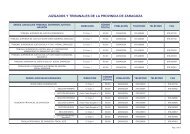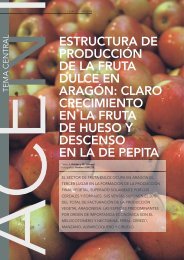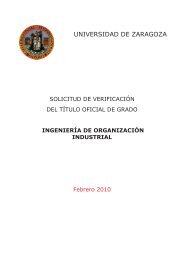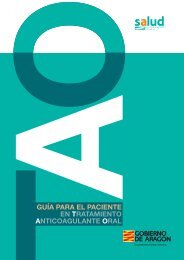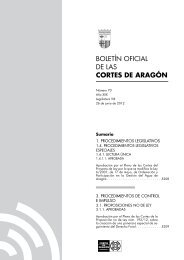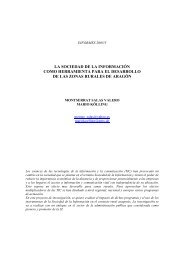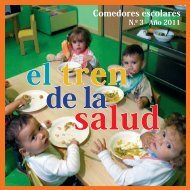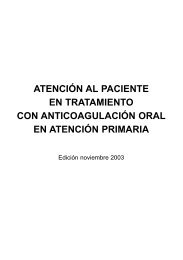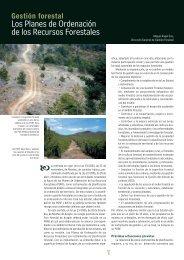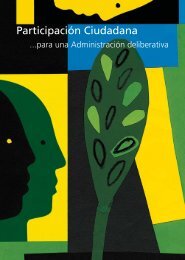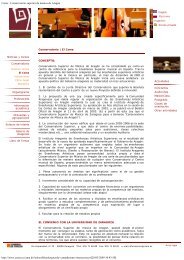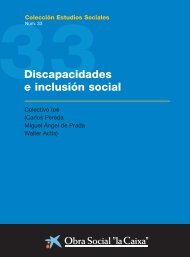Educación para todos: el imperativo de la calidad - unesdoc - Unesco
Educación para todos: el imperativo de la calidad - unesdoc - Unesco
Educación para todos: el imperativo de la calidad - unesdoc - Unesco
Create successful ePaper yourself
Turn your PDF publications into a flip-book with our unique Google optimized e-Paper software.
5<br />
0<br />
190 / CAPÍTULO 4<br />
0<br />
2<br />
Informe <strong>de</strong> Seguimiento <strong>de</strong> <strong>la</strong> <strong>Educación</strong> <strong>para</strong> Todos en <strong>el</strong> Mundo<br />
Cuadro 4.11: Mejora <strong>de</strong> <strong>la</strong> escu<strong>el</strong>a: repercusiones en <strong>la</strong> política <strong>de</strong> educación<br />
Estrategias<br />
Centrarse en <strong>el</strong> aprovechamiento<br />
esco<strong>la</strong>r y <strong>la</strong> autonomía <strong>de</strong> los<br />
alumnos.<br />
Pre<strong>para</strong>r un p<strong>la</strong>n <strong>de</strong> estudios y<br />
programas <strong>de</strong> enseñanza basados<br />
en <strong>el</strong> estado <strong>de</strong> conocimientos<br />
sobre <strong>el</strong> aprendizaje.<br />
Crear <strong>la</strong>s condiciones y<br />
capacida<strong>de</strong>s necesarias <strong>para</strong><br />
<strong>la</strong> mejora <strong>de</strong> <strong>la</strong> escu<strong>el</strong>a.<br />
Aplicar estrategias <strong>de</strong> cambio<br />
centradas en objetivos precisos.<br />
Crear un contexto <strong>de</strong> política<br />
y re<strong>de</strong>s <strong>de</strong> apoyo externo.<br />
Fuente: Hopkins (2001).<br />
Repercusiones en <strong>la</strong> política <strong>de</strong> educación<br />
Centrarse sin <strong>de</strong>scanso en <strong>el</strong> aprovechamiento<br />
esco<strong>la</strong>r y <strong>el</strong> aprendizaje <strong>de</strong> los alumnos.<br />
Pre<strong>para</strong>r un p<strong>la</strong>n <strong>de</strong> estudios y programas<br />
<strong>de</strong> enseñanza basados en <strong>el</strong> estado <strong>de</strong><br />
conocimientos sobre <strong>el</strong> aprendizaje.<br />
Prestar atención al contexto, tratando <strong>de</strong> saber<br />
qué es eficaz y en qué situaciones.<br />
Promover <strong>la</strong> creación <strong>de</strong> capacida<strong>de</strong>s y<br />
consolidar los <strong>el</strong>ementos que <strong>la</strong> propician.<br />
Promover <strong>la</strong>s comunida<strong>de</strong>s profesionales <strong>de</strong><br />
aprendizaje y estimu<strong>la</strong>r <strong>la</strong> investigación sobre<br />
los docentes y <strong>la</strong>s escu<strong>el</strong>as.<br />
Mejorar <strong>la</strong> investigación y <strong>la</strong> difusión <strong>de</strong> sus<br />
resultados, y hacer que sea pertinente <strong>para</strong><br />
los profesionales.<br />
Comprometerse a llevar a cabo una aplicación<br />
eficaz y <strong>de</strong>dicar <strong>el</strong> tiempo necesario a esta tarea.<br />
Combinar presión y apoyo a <strong>todos</strong> los niv<strong>el</strong>es<br />
d<strong>el</strong> sistema.<br />
Establecer infraestructuras y re<strong>de</strong>s locales<br />
apoyadas por una buena mediación externa.<br />
Garantizar <strong>la</strong> coherencia <strong>de</strong> <strong>la</strong> política.<br />
En un reciente estudio sobre <strong>la</strong> mejora <strong>de</strong> <strong>la</strong><br />
escu<strong>el</strong>a se seña<strong>la</strong>, sin embargo, que aunque los<br />
contextos nacionales sean diferentes, es improbable<br />
que los encargados <strong>de</strong> <strong>la</strong> reforma educativa<br />
en los países en <strong>de</strong>sarrollo disientan <strong>de</strong> <strong>todos</strong> o<br />
<strong>de</strong> <strong>la</strong> mayoría <strong>de</strong> los siguientes postu<strong>la</strong>dos:<br />
La reforma <strong>de</strong> <strong>la</strong> educación <strong>de</strong>be dar<br />
resultados a niv<strong>el</strong> <strong>de</strong> <strong>la</strong> escu<strong>el</strong>a.<br />
Un enfoque interinstitucional <strong>de</strong>be prestar<br />
apoyo a <strong>la</strong> escu<strong>el</strong>a.<br />
Las vincu<strong>la</strong>ciones d<strong>el</strong> sistema <strong>de</strong>ben ser<br />
amplias y profundas.<br />
La reforma es <strong>de</strong> por sí un proceso <strong>de</strong><br />
aprendizaje.<br />
Se requiere una visión sólida <strong>de</strong> <strong>la</strong> reforma.<br />
Es preciso centrarse en <strong>la</strong> práctica d<strong>el</strong> au<strong>la</strong>.<br />
Los profesores también <strong>de</strong>ben apren<strong>de</strong>r.<br />
El compromiso resulta <strong>de</strong> <strong>la</strong> autonomía.<br />
Tanto <strong>la</strong>s iniciativas locales como centrales<br />
pue<strong>de</strong>n ser eficaces.<br />
Los padres <strong>de</strong> familia y <strong>la</strong> comunidad son<br />
<strong>de</strong>terminantes. 65<br />
Si se aceptan estos postu<strong>la</strong>dos, “<strong>la</strong> mejora <strong>de</strong><br />
<strong>la</strong> escu<strong>el</strong>a” tiene i<strong>de</strong>as que pue<strong>de</strong>n beneficiar<br />
65. Estos postu<strong>la</strong>dos se basan en Hopkins (2001), que a su vez se basa<br />
en Dalin (1994).<br />
a <strong>todos</strong> los <strong>de</strong>más sistemas. Tal vez <strong>el</strong> mensaje<br />
c<strong>la</strong>ve <strong>de</strong> este concepto <strong>para</strong> algunos <strong>de</strong> los<br />
países más pobres es que ayuda a reflexionar<br />
sobre <strong>la</strong>s acciones que se requieren <strong>para</strong> lograr<br />
que <strong>la</strong> escu<strong>el</strong>a sea parte integrante d<strong>el</strong> proceso<br />
<strong>de</strong> cambio. No está c<strong>la</strong>ro en qué medida se<br />
pue<strong>de</strong> aplicar este mod<strong>el</strong>o, pero constituye<br />
una base <strong>para</strong> analizar si <strong>la</strong> escu<strong>el</strong>a pue<strong>de</strong><br />
ser <strong>de</strong>terminante cuando se coloca como centro<br />
<strong>de</strong> un mod<strong>el</strong>o <strong>de</strong> reforma.<br />
Desarrollo global <strong>de</strong> <strong>la</strong> escu<strong>el</strong>a<br />
En algunos países en <strong>de</strong>sarrollo <strong>el</strong> enfoque<br />
adoptado <strong>para</strong> los proyectos generales o<br />
reformas nacionales es <strong>el</strong> “<strong>de</strong>sarrollo global <strong>de</strong><br />
<strong>la</strong> escu<strong>el</strong>a” o “reforma”, que se inspira en i<strong>de</strong>as<br />
generadas por estudios sobre <strong>el</strong> concepto <strong>de</strong><br />
mejora <strong>de</strong> <strong>la</strong> escu<strong>el</strong>a. Ejemplos <strong>de</strong> esto son los<br />
proyectos financiados por <strong>el</strong> Aga Khan en países<br />
<strong>de</strong> África Oriental y en Sudáfrica, Sri Lanka y<br />
Ghana (Akyeampong, 2004; y Sayed, Akyeampong<br />
y Ampiah, 2000).<br />
En Ghana, <strong>el</strong> Programa <strong>de</strong> Desarrollo Global<br />
<strong>de</strong> <strong>la</strong> Escu<strong>el</strong>a apunta a lograr los objetivos<br />
d<strong>el</strong> Proyecto <strong>de</strong> <strong>Educación</strong> Básica Universal,<br />
Obligatoria y Gratuita. Se d<strong>el</strong>ega más autoridad<br />
y responsabilidad en escu<strong>el</strong>as, comunida<strong>de</strong>s<br />
y distritos <strong>para</strong> mejorar <strong>la</strong> <strong>calidad</strong> <strong>de</strong> <strong>la</strong><br />
educación, centrando <strong>la</strong> atención en:<br />
<strong>la</strong> práctica centrada en <strong>el</strong> niño <strong>para</strong> <strong>el</strong><br />
aprendizaje <strong>de</strong> <strong>la</strong> lectura, <strong>la</strong> escritura, <strong>la</strong><br />
aritmética y <strong>la</strong> resolución <strong>de</strong> problemas;<br />
<strong>la</strong> participación <strong>de</strong> <strong>la</strong> comunidad en <strong>el</strong> proceso<br />
<strong>de</strong> educación;<br />
<strong>la</strong> formación complementaria <strong>de</strong> los<br />
profesores en <strong>la</strong> escu<strong>el</strong>a;<br />
<strong>la</strong> p<strong>la</strong>nificación y <strong>la</strong> gestión participativas<br />
<strong>de</strong> los recursos; y<br />
<strong>la</strong> mayor eficacia en <strong>la</strong> gestión <strong>de</strong> los recursos.<br />
Estos objetivos (Ghana Education Service, 2004)<br />
fundamentan <strong>la</strong>s estrategias presentadas en <strong>el</strong><br />
Recuadro 4.16.<br />
El programa ha dado lugar a toda una serie <strong>de</strong><br />
innovaciones positivas intermedias y hay indicios<br />
<strong>de</strong> que influye en <strong>la</strong> mejora <strong>de</strong> <strong>la</strong> <strong>calidad</strong> d<strong>el</strong><br />
aprendizaje en Ghana. 66 Sin embargo, tropieza<br />
66. Véanse Akyeampong (2004), Banco Mundial (2004f), Akyeampong y<br />
otros (2000a) y Sayed, Akyeampong y Ampiah (2000). El Banco Mundial<br />
(2004f) seña<strong>la</strong> que <strong>la</strong> participación <strong>de</strong> <strong>la</strong> escu<strong>el</strong>a en <strong>el</strong> mod<strong>el</strong>o <strong>de</strong><br />
<strong>de</strong>sarrollo esco<strong>la</strong>r global ha mejorado los resultados en inglés y<br />
matemáticas.



